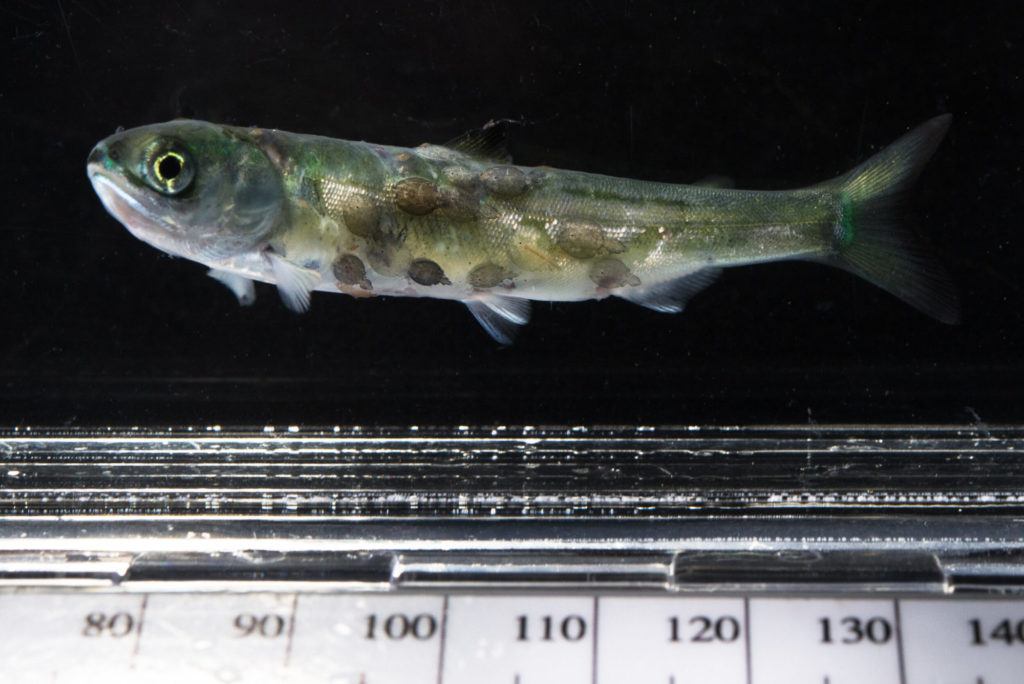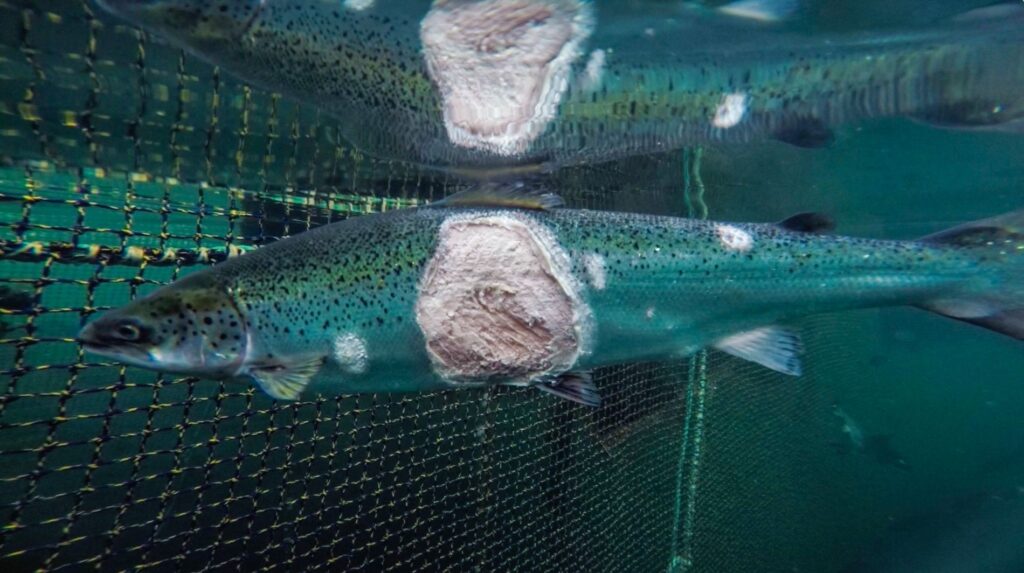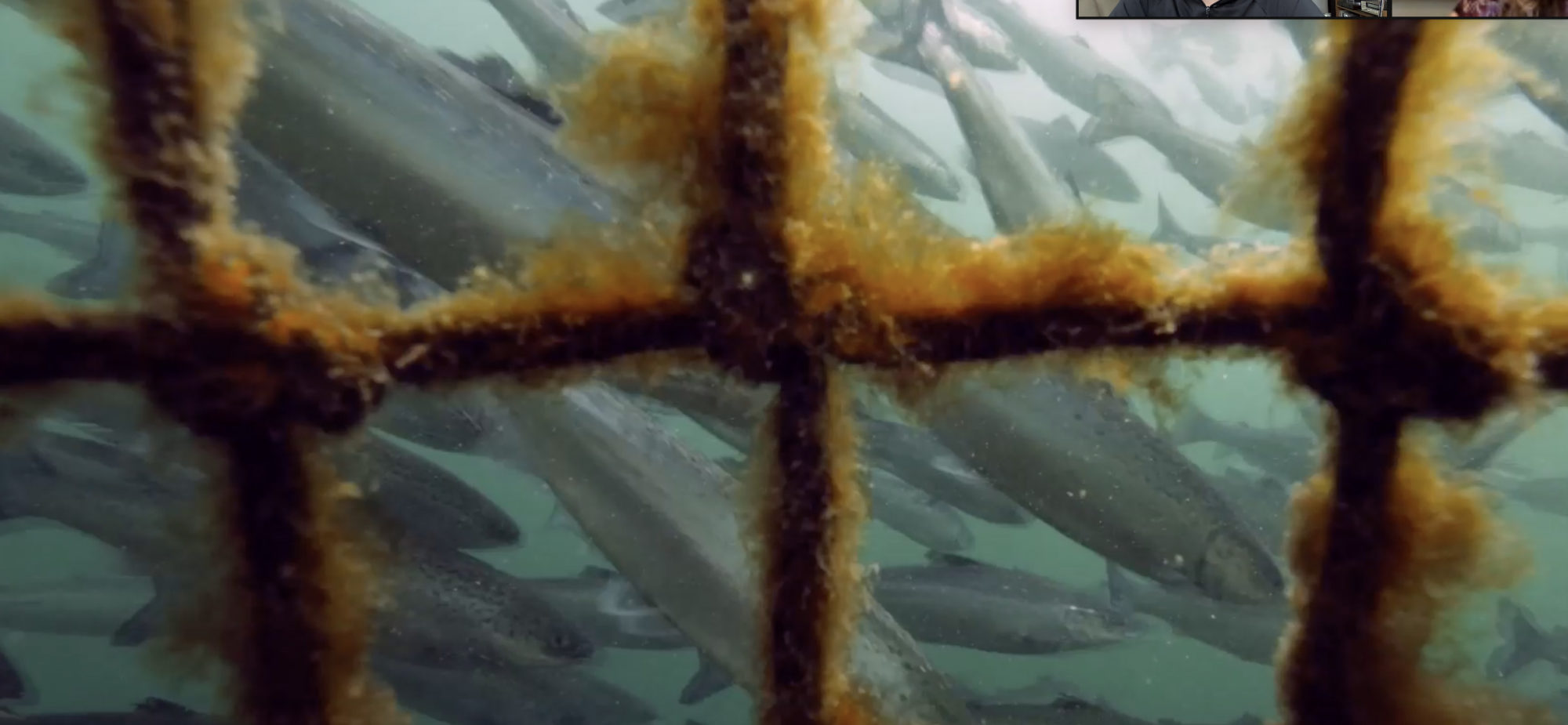Explore peer-reviewed research on the parasites, pathogens and pollutants released from open-net pen salmon farms into BC waters — and their deadly impact on wild Pacific salmon.
The science is clear: open net pen fish farms put wild Pacific salmon at risk
Piscine Orthoreovirus (PRV)
Piscine Orthoreovirus (PRV) is a highly contagious virus affecting salmon in BC. A new study, published May 26, 2021, from the University of British Columbia, the Department of Fisheries and Oceans, GenomeBC and Pacific Salmon Foundation shows PRV (piscine orthoreovirus) arrived in BC at the same time as industrial fish farming. It confirms that, during their time in open net pen fish farms, nearly all farmed salmon are infected with PRV[1].
The study also confirms that endangered wild Chinook salmon from areas near the farms are far more likely to pick up the infection than Chinook in areas without farms. In Chinook salmon, the virus causes kidney and liver damage that can be fatal.
In Norway, PRV has been linked to Heart and Skeletal Muscle Inflammation (HSMI), which causes problems with the heart, liver, spleen, and other internal organs in salmon. HSMI has a mortality rate of 20%[2]. It is a deadly disease that can quickly devastate a salmon population.
PRV is extremely contagious. 95% of farmed salmon in BC test positive for PRV[3]. The dense nature of open net pen fish farms allows PRV to mutate to higher levels of virulence. Most concerning, PRV can be spread through water, making wild Pacific salmon who come in close proximity to open net pen fish farms highly susceptible to the virus. PRV is a powerful example of what happens when viruses are left to replicate in open net pen fish farms.
95% of farmed salmon in BC test positive for PRV
[1] Mordecai, Gideon J., et al. “Aquaculture Mediates Global Transmission of a Viral Pathogen to Wild Salmon.” Science Advances, vol. 7, no. 22, 26 May 2021, doi:10.1126/sciadv.abe2592.
[2] Available at: https://www.dfo-mpo.gc.ca/science/aah-saa/species-especes/aq-health-sante/prv-rp-eng.html [Accessed 12 November 2019].
[3] Ahmed Siah, J. P. A. F., 2018. Piscean Orthoreovirus (PRV) in Processing Plant Wastewater: A Review of Risk Factors for Wild Pacific Salmon, Vancouver: University of British Columbia.
Fisheries and Oceans Canada, 2018. Piscine Orthoreovirus (PRV) and Heart and Skeletal Muscle Inflammation (HSMI). [Online]
Sea Lice
Sea lice are parasites that cause serious harm to salmon. Sea lice incubate in the dense confines of commercial open net pen fish farms and then emerge directly into the path of young migrating salmon.
In the natural environment, smolts would not normally encounter sea lice. But in an open net pen fish farm, sea lice reproduce exponentially and become very difficult to measure, manage, and contain. [1] Vulnerable, young wild Pacific salmon are exposed to billions of sea lice as they pass by these farms placed dangerously close to their natural migration routes. Sea lice penetrate into the salmon’s flesh, puncture the skin and suck blood from young salmon. This has been shown to make them weaker and more susceptible to disease or illness – ultimately affecting the salmon run returns.
More concerning is that sea lice become resistant to drugs. [2] The prevalence and increasing resiliency of sea lice aren’t simply a threat to wild Pacific salmon, but are also responsible for major losses to the salmon farming industry itself. Even Norway, a recognized leader in sustainable aquaculture, has identified sea lice as its “single biggest issue.” [3]
In British Columbia, open net pen fish farms currently operate with little mandated real-time transparency about sea lice infestations. When data is reported, we see significant non-compliance and disregard for out-migrating salmon smolts. Wild Pacific salmon populations already face threats to their resiliency in the natural environment, we simply cannot afford to tolerate losses from wholly avoidable sea lice infestations.
Sea lice become resistant to drugs

[1] Costello, M.S. (2009, July 8) How sea lice from salmon farms may cause wild salmonid declines in Europe and North America and be a threat to fishes elsewhere. Retrieved November 13, 2019. https://royalsocietypublishing.org/doi/full/10.1098/rspb.2009.0771
[2] Stian MørchAaen, Kari Olli Helgesen, Marit Jørgensen Bakke, Kiranpreet Kaur, Tor Einar Horsberg., 2015. Drug resistance in sea lice: a threat to salmonid aquaculture. Trends in Parasitology, 31(2), pp. 72-81.
[3] Ramsden, N. (2014, March 6) Aarskog: ‘Whoever solves sea lice, come and see me, because we need help’. Retrieved November 13, 2019. https://www.undercurrentnews.com/2014/03/06/aarskog-whoever-solves-sea-lice-come-and-see-me-because-we-need-help/
Tenacibaculum
Tenacibaculum maritimum is a marine bacterium commonly found in Atlantic salmon farms in BC, where it causes the acute oral ulcer disease known as mouth rot [1][2].
In wild Pacific salmon, T. maritimum leads to a different condition: tenacibaculosis, which results in debilitating health issues and increased mortality[5]. Whereas infections in farmed fish can be managed with antibiotics, wild salmon lack access to veterinary care, making them completely vulnerable to the harmful effects of tenacibaculosis.
Open-net pen salmon farms play a major role in spreading T. maritimum in the marine environment[3][4]. While a previous CSAS review in 2020 downplayed this link, the latest research confirms that detection rates of the bacterium in juvenile Fraser River sockeye peak as the fish migrate past salmon farms in the Discovery Islands[6] [7]. These findings clearly link open-net pen salmon farms to the spread of T. maritimum infections threatening BC’s wild Pacific salmon populations.
Sea lice become resistant to drugs

[1] K. Frisch, S. B. Småge, C. Vallestad, H. Duesund, Ø. J. Brevik, A. Klevan, R. H. Olsen, S. T. Sjaatil, D. Gauthier, B. Brudeseth, A. Nylund, J. Fish Dis. 2018, DOI 10.1111/jfd.12818.
[2] Advice from the Assessment of the Risk to Fraser River Sockeye Salmon Due to Tenacibaculum Maritimum Transfer from Atlantic Salmon Farms in the Discovery Islands Area, British Columbia, Canadian Science Advisory Secretariat, 2020.
[3] A. W. Bateman, A. D. Schulze, K. H. Kaukinen, A. Tabata, G. Mordecai, K. Flynn, A. Bass, E. Di Cicco, K. M. Miller, Sci. Rep. 2021, 11, 3466.
[4] D. Shea, A. Bateman, S. Li, A. Tabata, A. Schulze, G. Mordecai, L. Ogston, J. P. Volpe, L. Neil Frazer, B. Connors, K. M. Miller, S. Short, M. Krkošek, Proc. Biol. Sci. 2020, 287, 20202010.
[5] A. L. Bass, A. W. Bateman, B. M. Connors, B. A. Staton, E. B. Rondeau, G. J. Mordecai, A. K. Teffer, K. H. Kaukinen, A. Tabata, D. A. Patterson, S. G. Hinch, K. M. Miller, FACETS 2022.
[6] A. W. Bateman, A. K. Teffer, A. Bass, T. Ming, B. P. V. Hunt, bioRxiv 2021.
[7] A. W. Bateman, A. K. Teffer, A. Bass, T. Ming, K. Kaukinen, B. P. V. Hunt, M. Krkošek, K. M. Miller, Can. J. Fish. Aquat. Sci. 2022, 1.
Fish Farm Waste
Fish farm waste is having a significant impact on the health of wild Pacific salmon. Although far from the only source of pollution in our oceans, open net pen fish farms discharge extraordinarily high concentrations of untreated sewage. These include large quantities of chemicals including copper, zinc, antibiotics such as oxytetracycline and oxolinic acid, anti-parasite compounds like ivermectin, and numerous insecticides. [1]
BC currently has over 100 open net pen fish farms. A single average-sized fish farm of 200,000-fish produces:
- fecal matter equivalent to 65,000 people
- nitrogen equivalent to 20,000 people
- phosphorous equivalent to 25,000 people[2]
When compared to humans, these numbers are staggering. In 2000, WWF Scotland calculated that phosphorous nutrient pollution from Scottish aquaculture was comparable to a city of 9.4 million people. At that time, Scotland’s population was just over 5 million people. [3]
This pollution contaminates the seabed and damages marine biodiversity – not just directly below the open net-pen salmon farms, but also hundreds of metres away. Marine dives have found these “dead zones” are completely devoid of marine life. [4]
Open net pen fish farms pollute our oceans for free. While fish farming is an important industry, it is imperative that BC moves to more sustainable farming methods with land based closed containment farms to ensure the preservation of the province’s delicate ecosystems.
BC currently has over 100 open net pen fish farms

[1] Miranda, C.D., et al. 2003. Diversity of tetracycline resistance genes in bacteria from Chilean salmon farms. Antimicrobial Agents and Chemotherapy 47 (2003). Pp 883-888. https://aac.asm.org/content/47/3/883.abstract
[2] Hardy, R.W. 2000. Urban legends and fish nutrition. Aquaculture Magazine Nov/Dec 2000.
[3] MacGarvin, M. 2000. Scotland’s Secret? Aquaculture, nutrient pollution eutrophication and toxic blooms: modus vivendi for WWF Scotland. https://www.wwf.org.uk/sites/default/files/2000-01/secret.pdf
[4] Stanford University. 2009. When Fish Farms Are Built Along The Coast, Where Does The Waste Go?. ScienceDaily. https://www.sciencedaily.com/releases/2009/02/090215151758.htm
